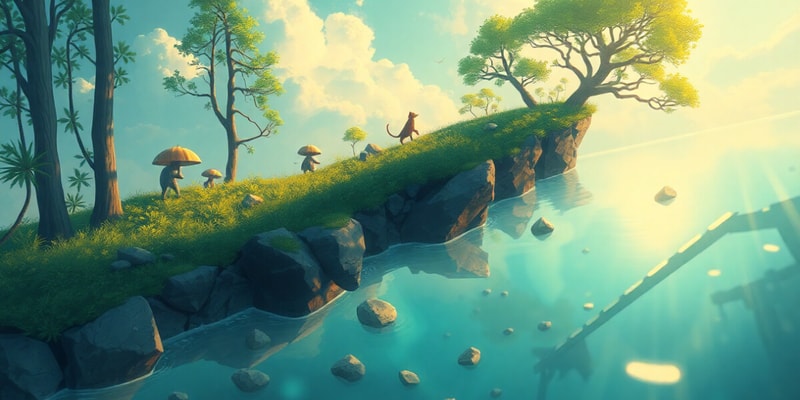Podcast
Questions and Answers
What environmental factor primarily influences wildebeest migration patterns?
What environmental factor primarily influences wildebeest migration patterns?
During which months do wildebeest herds predominantly occupy the southern Serengeti?
During which months do wildebeest herds predominantly occupy the southern Serengeti?
Which region do wildebeest spend the least amount of time in, according to the information provided?
Which region do wildebeest spend the least amount of time in, according to the information provided?
What challenge do wildebeest face in the western region during June and July?
What challenge do wildebeest face in the western region during June and July?
Signup and view all the answers
What happens to the migration pattern of wildebeest as they seek food?
What happens to the migration pattern of wildebeest as they seek food?
Signup and view all the answers
What does BTB turn to when carbon dioxide is taken OUT of the solution?
What does BTB turn to when carbon dioxide is taken OUT of the solution?
Signup and view all the answers
Which of the following is true about the plants wrapped in aluminum foil?
Which of the following is true about the plants wrapped in aluminum foil?
Signup and view all the answers
Which ecosystems were studied for their carbon sink effects?
Which ecosystems were studied for their carbon sink effects?
Signup and view all the answers
What was a common factor affecting carbon release in various ecosystems?
What was a common factor affecting carbon release in various ecosystems?
Signup and view all the answers
What color indicates a high concentration of carbon in BTB?
What color indicates a high concentration of carbon in BTB?
Signup and view all the answers
What causes a natural population to increase?
What causes a natural population to increase?
Signup and view all the answers
Which of the following is a primary factor affecting population size?
Which of the following is a primary factor affecting population size?
Signup and view all the answers
Which organism uses energy from the sun to create food?
Which organism uses energy from the sun to create food?
Signup and view all the answers
What is the main objective of the 30x30 initiative?
What is the main objective of the 30x30 initiative?
Signup and view all the answers
Which of the following best defines limiting factors?
Which of the following best defines limiting factors?
Signup and view all the answers
What role do decomposers play in an ecosystem?
What role do decomposers play in an ecosystem?
Signup and view all the answers
Which factor is critical for the wildebeest population's growth?
Which factor is critical for the wildebeest population's growth?
Signup and view all the answers
Which of the following statements is true about consumers?
Which of the following statements is true about consumers?
Signup and view all the answers
What kind of organization is the Serengeti National Park recognized as?
What kind of organization is the Serengeti National Park recognized as?
Signup and view all the answers
Which of the following is an abiotic limiting factor?
Which of the following is an abiotic limiting factor?
Signup and view all the answers
During which months does calving season occur in the Serengeti?
During which months does calving season occur in the Serengeti?
Signup and view all the answers
What significant event occurs in June for the herds in the Serengeti?
What significant event occurs in June for the herds in the Serengeti?
Signup and view all the answers
Why are wildebeest considered a keystone species in the Serengeti?
Why are wildebeest considered a keystone species in the Serengeti?
Signup and view all the answers
What happens to the dung beetle population if the kori bustard is removed?
What happens to the dung beetle population if the kori bustard is removed?
Signup and view all the answers
What form of competition do wildebeest engage in during migration?
What form of competition do wildebeest engage in during migration?
Signup and view all the answers
Which river do the herds cross from Tanzania into Kenya in July?
Which river do the herds cross from Tanzania into Kenya in July?
Signup and view all the answers
How do wildebeest and zebras interact during their migration?
How do wildebeest and zebras interact during their migration?
Signup and view all the answers
What effect does removing grass from the ecosystem have on wildebeest?
What effect does removing grass from the ecosystem have on wildebeest?
Signup and view all the answers
In which month do the herds typically return to the Serengeti from the Masai Mara?
In which month do the herds typically return to the Serengeti from the Masai Mara?
Signup and view all the answers
What is one challenge that the Serengeti faces in terms of development?
What is one challenge that the Serengeti faces in terms of development?
Signup and view all the answers
Which group is NOT considered an interest holder in the development of a road connecting park areas?
Which group is NOT considered an interest holder in the development of a road connecting park areas?
Signup and view all the answers
What is the primary product of cellular respiration?
What is the primary product of cellular respiration?
Signup and view all the answers
How does an increase in atmospheric carbon dioxide affect the environment?
How does an increase in atmospheric carbon dioxide affect the environment?
Signup and view all the answers
Which process directly takes in carbon dioxide and produces oxygen?
Which process directly takes in carbon dioxide and produces oxygen?
Signup and view all the answers
What role do trees play with respect to atmospheric carbon dioxide?
What role do trees play with respect to atmospheric carbon dioxide?
Signup and view all the answers
Which statement about peat formation is accurate?
Which statement about peat formation is accurate?
Signup and view all the answers
During cellular respiration, which two compounds are primarily produced?
During cellular respiration, which two compounds are primarily produced?
Signup and view all the answers
What happens when forests are burned?
What happens when forests are burned?
Signup and view all the answers
How do consumers, like animals, contribute to the carbon cycle?
How do consumers, like animals, contribute to the carbon cycle?
Signup and view all the answers
What effect does an increase in forest size have on atmospheric CO2 levels?
What effect does an increase in forest size have on atmospheric CO2 levels?
Signup and view all the answers
What causes zombie fires to burn in the melted peat?
What causes zombie fires to burn in the melted peat?
Signup and view all the answers
What was observed regarding yeast cellular respiration at various temperatures?
What was observed regarding yeast cellular respiration at various temperatures?
Signup and view all the answers
How does peat burning compare to other carbon sources like wood?
How does peat burning compare to other carbon sources like wood?
Signup and view all the answers
What happens to the color of BTB when carbon is taken out during photosynthesis?
What happens to the color of BTB when carbon is taken out during photosynthesis?
Signup and view all the answers
Which temperature condition led to minimal yeast respiration in the experiments?
Which temperature condition led to minimal yeast respiration in the experiments?
Signup and view all the answers
What effect does increased temperature on decomposers have on the permafrost layer?
What effect does increased temperature on decomposers have on the permafrost layer?
Signup and view all the answers
What is the significance of the tilt of the Earth’s axis on photosynthesis back in history?
What is the significance of the tilt of the Earth’s axis on photosynthesis back in history?
Signup and view all the answers
Which plant condition led to only minor photosynthesis observed in the experiments?
Which plant condition led to only minor photosynthesis observed in the experiments?
Signup and view all the answers
Study Notes
Ecosystem Interactions and Dynamics
- Natural populations fluctuate, grow, and shrink.
- Population increase (growth) occurs when births exceed deaths.
- Population decrease (shrink) occurs when deaths exceed births.
- Population size is influenced by food availability, reproductive success, predator numbers, extreme weather, and habitat/climate change.
- Producers use sunlight to create food through photosynthesis (e.g., plants).
- Consumers get their energy by consuming other organisms (e.g., animals).
- Decomposers break down dead organisms to release energy (e.g., mushrooms, worms).
30x30 Initiative
- This initiative aims to protect 30% of the planet's land, oceans, and freshwaters by 2030.
- Humans conserve land and waters for various reasons.
- Serengeti National Park is recognized as a site of outstanding universal value to humanity.
Limiting Factors
- Limiting factors restrict population growth.
- These factors can be living (biotic) or non-living (abiotic).
- Examples include space, food availability, mates, weather, predation, and disease.
Limiting Factors of Wildebeest
- Grass availability is a crucial limiting factor. Wildebeest migrate to find sufficient food.
- Rainfall directly impacts grass growth, thus influencing wildebeest migration patterns.
Wildebeest and Migration Pattern
- Wildebeest migration tracks rainfall patterns, moving in a clockwise direction across the Serengeti.
- Specific seasons are linked to calving, short-grass plains, and the Western Corridor.
- Movements align with the Grumeti River crossing and the arrival in the Masai Mara.
Keystone Species
- Keystone species are crucial for ecosystem stability.
- If removed, the ecosystem will change.
- Wildebeest are a keystone species in the Serengeti.
- Their presence impacts various other organisms (e.g., dung beetles, predators).
- They are a food source and their dung fertilizes the land.
Interaction Map
- The interaction map depicts relationships between various organisms in the ecosystem.
- It shows how they affect and depend on each other.
- The map helps visualize interdependencies, food chains, and competition.
What Happens if a Grasshopper Is Removed?
- More grass would be available for other organisms like gazelles and zebras.
What if the Kori Bustard Is Removed?
- The dung beetle population would likely increase, as they would face less predation.
What Happens if the Grass Is Removed?
- Wildebeest would face a food shortage, motivating them to migrate in search of new grazing lands.
Cellular Respiration
- The process where oxygen and glucose produce carbon dioxide and water, providing energy for all living things.
Photosynthesis
- Processes where carbon dioxide and energy (sunlight) are used to create energy (ATP) and release oxygen.
- Producers (plants) use photosynthesis.
Peat Formation
- Peat forms in arctic regions through the accumulation of dead, decomposed plants.
- Peat acts as a significant carbon sink, storing carbon for thousands of years.
Zombie Fires and Peat
- Zombie fires are related to thawing permafrost and burning peat.
- Peat releases massive amounts of carbon into the atmosphere, resulting in a positive feedback loop.
- Lab investigations (with yeast) reveal how temperature influences carbon release (more at warmer temperatures).
Carbon Sinks
- Various locations around the globe serve as carbon sinks, capturing carbon (e.g., the Amazon rainforest, Australian eucalyptus forests, California Redwoods).
- Fires and temperature increases cause more carbon release from these sinks.
Arctic Cooling/Warming
- The arctic regions previously experienced colder temperatures with low solar energy.
- The current arctic has warming temperatures and thawing permafrost, impacting peat and leading to carbon release.
Studying That Suits You
Use AI to generate personalized quizzes and flashcards to suit your learning preferences.
Related Documents
Description
Test your knowledge on the dynamics of ecosystems, including population fluctuations, growth, and the role of producers, consumers, and decomposers. Explore the significance of limiting factors and conservation initiatives like the 30x30 Initiative aimed at protecting our planet's resources. Dive deep into how these elements interact and affect biodiversity.




